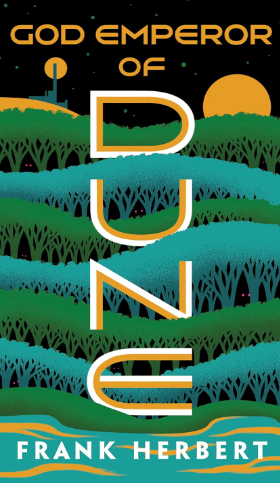God Emperor of Dune

"God Emperor of Dune" by Frank Herbert is the fourth novel in the Dune series and marks a significant shift in both the timeline and tone of the saga. Set thousands of years after the events of Children of Dune, the story centers on Leto II Atreides, the son of Paul Atreides, who has become the God Emperor of the known universe. Leto has transformed into a hybrid of human and sandworm, granting him near-immortality and extraordinary power. His reign has led to a stagnant, authoritarian empire where he controls all aspects of society, including religion, politics, and the flow of the precious spice melange. However, despite his absolute control, Leto is haunted by the prescient visions that guided his transformation and is burdened by his role in shaping humanity’s future. As his empire faces growing unrest, Leto must confront the paradoxes of his existence and determine whether he can continue his seemingly tyrannical reign or open a path to the future.
Herbert’s "God Emperor of Dune" is a deeply philosophical novel that explores themes of power, immortality, sacrifice, and the burden of prescience. The book focuses less on action and more on the internal struggles of Leto II as he reflects on his long life, his vision for humanity, and the costs of his choices. The novel is notable for its introspective tone, as Leto engages in long, meditative monologues about the nature of leadership, the human condition, and the need for change.
The book’s pacing is slower compared to the earlier Dune novels, as much of the narrative centers on philosophical discourse and Leto’s internal conflict. For some readers, this can be a challenge, as it is more about ideas than plot-driven action. However, for those interested in the exploration of complex moral and existential dilemmas, God Emperor of Dune offers a rich and thought-provoking experience. The novel also continues the series’ exploration of ecology and the relationship between humanity and its environment, using Leto’s transformation into a sandworm hybrid as a metaphor for the interconnectedness of life and the long-term effects of humanity’s actions.
I highly recommend "God Emperor of Dune" to readers who are invested in the Dune series and enjoy deep, philosophical science fiction. It is a more meditative and cerebral installment that may not appeal to everyone, especially those who prefer faster-paced plots. However, for fans of Herbert’s exploration of political, religious, and ecological themes, it is a fitting continuation of the Dune saga and offers a profound meditation on the costs of power and the complexities of human nature.